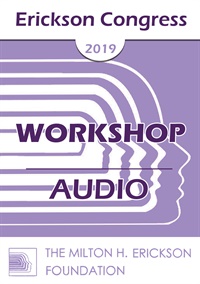
- Average Rating:
- Not yet rated
- Topic Areas:
- Workshops | Anxiety | Family Therapy | Homework | Children and Adolescent Therapy | Experiential Therapy
- Categories:
- Erickson Congress | Erickson Congress 2019
- Faculty:
- Lynn Lyons, LICSW
- Duration:
- 1 Hour 56 Minutes
- Format:
- Audio Only
- Original Program Date:
- Dec 13, 2019
- Short Description:
- After decades of working with anxious children and teens, I have two unshakable truths: families MUST be involved in treatment and anxious patterns are shifted through experiential learning. Working with the FOUR critical concepts to manage anxiety in families and the SIX patterns that must be interrupted, this workshop will describe HOW to create active, engaging assignments for families to do between sessions and describe the TEN favorites that I return to again and again.
- Price:
- $15.00 - Base Price
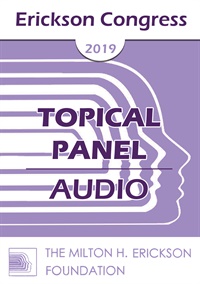
- Average Rating:
- Not yet rated
- Topic Areas:
- Topical Panels | Homework | Therapist Development
- Categories:
- Erickson Congress | Erickson Congress 2019
- Faculty:
- Teresa Garcia-Sanchez, MA | Wendel Ray, PhD | Albina Tamalonis, PsyD
- Duration:
- 59 Minutes
- Format:
- Audio Only
- Original Program Date:
- Dec 13, 2019
- Short Description:
- Therapy happens in life, not just in the consulting room. Assignments facilitate treatment goals.
- Price:
- $15.00 - Base Price
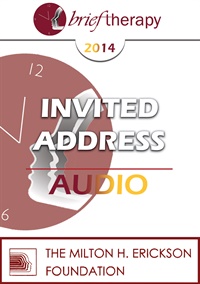
- Average Rating:
- Not yet rated
- Topic Areas:
- Anxiety | Invited Addresses | Brief Therapy | Children and Adolescent Therapy | Homework
- Categories:
- Brief Therapy Conference | Brief Therapy Conference 2014
- Faculty:
- Lynn Lyons, LICSW
- Duration:
- 1:01:55
- Format:
- Audio Only
- Original Program Date:
- Dec 14, 2014
- Short Description:
- When working with anxious kids, your brilliance in the office means nothing if they cannot take what you offer and use it in their world. This presentation will give you eight homework assignments to engage kids from the start, and will spark your strategic creativity as you develop your own homework ideas.
- Price:
- $15.00 - Base Price

- Average Rating:
- Not yet rated
- Topic Areas:
- Conversation Hours | Psychotherapy | Intervention Strategies | Therapist Techniques
- Categories:
- Evolution of Psychotherapy | Evolution of Psychotherapy 2013 | Pioneers in Couples and Family Therapy
- Faculty:
- Claudia Black, PhD
- Duration:
- 56:31
- Format:
- Audio Only
- Original Program Date:
- Dec 14, 2013
- Short Description:
- Black offers a powerful look into the experiences of partners of sex addicts, highlighting the deep trauma, PTSD symptoms, and co-addictions they may face. She emphasizes validation, family of origin work, psychoeducation, stabilization, and core issue healing. Topics include polygraphs, children, therapeutic separation, group support, and rebuilding integrity and self-respect.
- Price:
- $15.00 - Base Price
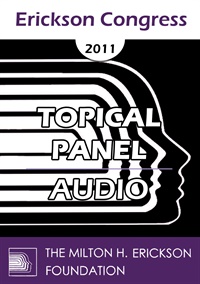
- Average Rating:
- Not yet rated
- Topic Areas:
- Topical Panels | Homework
- Categories:
- Erickson Congress | Erickson Congress 2011
- Faculty:
- Lynn Lyons, LICSW | Susy Signer-Fischer, Lic. Phil. Psych | John Edgette, PsyD
- Duration:
- 59 Minutes
- Format:
- Audio Only
- Original Program Date:
- Dec 07, 2011
- Short Description:
- Topical Panel on Homework Assignments, featuring John Edgette, Lynn Lyons, and Susy Signer-Fischer
- Price:
- $20.00 - Base Price
Tags: Homework
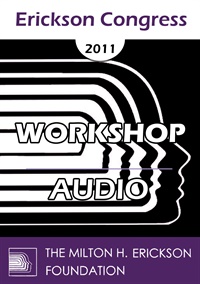
- Average Rating:
- Not yet rated
- Topic Areas:
- Workshops | Ericksonian Hypnosis and Therapy Techniques | Homework | Storytelling
- Categories:
- Erickson Congress | Erickson Congress 2011
- Faculty:
- Michael Munion, MA, LPC
- Duration:
- 59 Minutes
- Format:
- Audio Only
- Original Program Date:
- Dec 07, 2011
- Short Description:
- This workshop provides instruction and hands-on experience with Ericksonian interventions less commonly addressed than hypnosis. These include anecdotes, implication, paradox, and task assignments.
- Price:
- $20.00 - Base Price
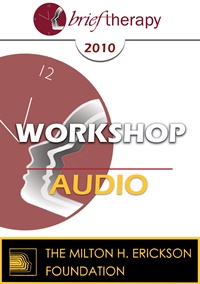
- Average Rating:
- Not yet rated
- Topic Areas:
- Hypnosis | Psychotherapy | Workshops | Strategic Therapy
- Categories:
- Brief Therapy Conference | Brief Therapy Conference 2010
- Faculty:
- Michael Yapko, PhD
- Duration:
- 2:22:02
- Format:
- Audio Only
- Original Program Date:
- Dec 10, 2010
- Short Description:
- This session explores the integration of hypnosis and strategic psychotherapy, highlighting how both approaches emphasize action, expectancy, and experiential learning. Participants learn how to design interventions that disrupt stuck patterns, cultivate tolerance for ambiguity, and foster new skills. Emphasizing hypnosis as a vehicle for seeding ideas and contextualizing resources, the workshop shows how therapists can build responsiveness, resilience, and long-term change in brief yet powerful ways.
- Price:
- $15.00 - Base Price
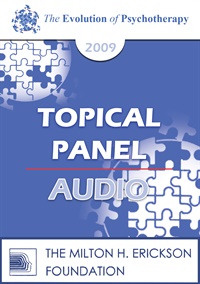
- Average Rating:
- Not yet rated
- Topic Areas:
- Topical Panels | Homework | Psychotherapy | Intervention Strategies | Therapist Techniques
- Categories:
- Evolution of Psychotherapy | Evolution of Psychotherapy 2009 | Pioneers in Couples and Family Therapy
- Faculty:
- Claudia Black, PhD | Harville Hendrix, PhD | Harriet Lerner, PhD
- Duration:
- 56 Minutes
- Format:
- Audio Only
- Original Program Date:
- Dec 11, 2009
- Short Description:
- Three leading therapists discuss homework assignments in therapy, sharing insights on enhancing client engagement and personal growth. They examine different approaches to between-session activities, from bibliotherapy to skill-building exercises, emphasizing the importance of client accountability and creative interventions. The panel highlights how strategic assignments can help clients practice new communication skills, challenge relationship patterns, and accelerate therapeutic progress.
- Price:
- $15.00 - Base Price
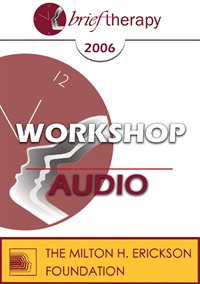
- Average Rating:
- Not yet rated
- Topic Areas:
- Workshops | Cognitive Behavior Therapy (CBT) | Hypnosis
- Categories:
- Brief Therapy Conference | Brief Therapy Conference 2006
- Faculty:
- Michael Yapko, PhD
- Duration:
- 2:39:09
- Format:
- Audio Only
- Original Program Date:
- Dec 10, 2006
- Short Description:
- This session explores how hypnosis enhances cognitive-behavioral therapy by amplifying focus, fostering cognitive flexibility, and reshaping automatic thoughts. Emphasizing experiential learning, the workshop highlights hypnosis as a tool for seeding behavioral activation, building positive expectancy, and helping clients reframe rigid beliefs. Participants gain both a structural model of hypnotic sessions and practical examples of applying hypnosis to depression, anxiety, pain management, and end-of-life care.
- Price:
- $15.00 - Base Price
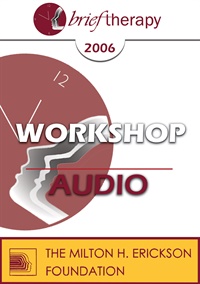
- Average Rating:
- Not yet rated
- Topic Areas:
- Workshops | Hypnosis | Experiential Therapy | Brief Therapy | Homework
- Categories:
- Brief Therapy Conference | Brief Therapy Conference 2006
- Faculty:
- Jeffrey Zeig, PhD
- Duration:
- 1:58:24
- Format:
- Audio Only
- Original Program Date:
- Dec 10, 2006
- Short Description:
- An experiential orientation empowers therapeutic change. Dramatic experiential methods can be used by any clinician in every stage of the therapeutic process including assessment, in session treatment and homework assignments. Techniques to be demonstrated and practiced include therapist sculpting, symbolic assignments and analogical tasks.
- Price:
- $15.00 - Base Price
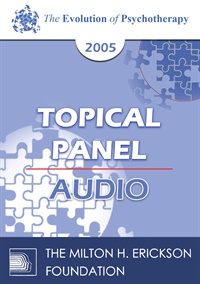
- Average Rating:
- Not yet rated
- Topic Areas:
- Topical Panels | Psychotherapy | Therapeutic Relationship | Therapist Development | Intervention Strategies
- Categories:
- Evolution of Psychotherapy | Evolution of Psychotherapy 2005 | Pioneers in Couples and Family Therapy
- Faculty:
- Claudia Black, PhD | William Glasser, MD | Salvador Minuchin, MD | Ernest Rossi, PhD
- Duration:
- 58 Minutes
- Format:
- Audio Only
- Original Program Date:
- Dec 09, 2005
- Short Description:
- An exploration of therapists' and patients' changing dynamics in psychotherapy, highlighting creative therapeutic processes, addiction treatment strategies, power dynamics in relationships, and systemic approaches to healing. Panelists address challenges in cross-cultural therapy and the importance of creating safe, supportive environments for client transformation. Moderated by Brent Geary.
- Price:
- $15.00 - Base Price
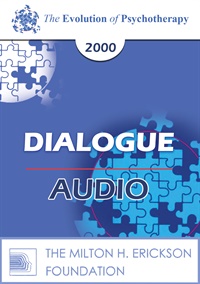
- Average Rating:
- Not yet rated
- Topic Areas:
- Dialogues | Brief Therapy | Intervention Strategies
- Categories:
- Evolution of Psychotherapy | Evolution of Psychotherapy 2000 | Pioneers in Couples and Family Therapy
- Faculty:
- William Glasser, MD | Paul Watzlawick, PhD
- Duration:
- 56 Minutes
- Format:
- Audio Only
- Original Program Date:
- May 28, 2000
- Short Description:
- Glasser and Watzlawick explore how small shifts in attitude and approach can lead to big changes in therapy. Glasser draws from his work in schools and hospitals, showing how empathy and avoiding control help build trust. Watzlawick adds stories of paradox and surprise, reminding us that change often comes when we least expect it...and that the therapist's stance can make all the difference. Moderated by Camillo Loriedo
- Price:
- $15.00 - Base Price
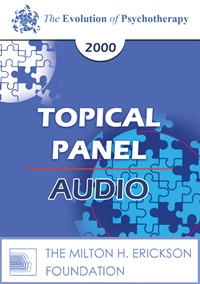
- Average Rating:
- Not yet rated
- Topic Areas:
- Topical Panels | Homework | Therapist Development | Strategic Therapy
- Categories:
- Evolution of Psychotherapy | Evolution of Psychotherapy 2000 | Pioneers in Couples and Family Therapy
- Faculty:
- Alexander Lowen, MD | Miriam Polster | Paul Watzlawick, PhD | Jeffrey Zeig, PhD
- Duration:
- 55 Minutes
- Format:
- Audio Only
- Original Program Date:
- May 28, 2000
- Short Description:
- This panel looks at how creative homework assignments can extend therapy beyond the session. From movement and breathwork to exposure tasks and playful challenges, the therapists share ways to help clients try out new behaviors and shift stuck patterns. Whether it’s making a difficult phone call or practicing being rejected, the goal is to foster agency, insight, and change in everyday life. Moderated by Bernhard Trenkle, Dipl. Psych.
- Price:
- $15.00 - Base Price

- Average Rating:
- Not yet rated
- Topic Areas:
- Topical Panels | Homework | Psychotherapy | Addiction | Behavioral Therapy
- Categories:
- Evolution of Psychotherapy | Evolution of Psychotherapy 1995 | Pioneers in Couples and Family Therapy
- Faculty:
- Claudia Black, PhD | Jay Haley, MA | Arnold Lazarus, Ph.D. | Joseph LoPiccolo, PhD
- Duration:
- 57 Minutes
- Format:
- Audio Only
- Original Program Date:
- Dec 16, 1995
- Short Description:
- Homework plays a key role in therapy, particularly in addiction and behavioral treatment. This group of experts emphasizes the use of empowering, tailored assignments to boost engagement and minimize resistance. They underscore the value of both direct and indirect directives, while highlighting the need for flexibility, ethical clarity, and customization based on individual client needs. Moderated by Bernhard Trenkle.
- Price:
- $15.00 - Base Price
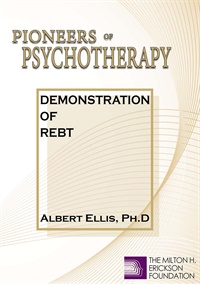
- Average Rating:
- Not yet rated
- Topic Areas:
- Clinical Demonstrations | Rational Emotive Behavior Therapy (REBT) | Homework | Humor
- Bundle(s):
- Pioneers of Psychotherapy Bundle
- Categories:
- Pioneers of Psychotherapy | Evolution of Psychotherapy | Evolution of Psychotherapy 1995
- Faculty:
- Albert Ellis, PhD
- Course Levels:
- Master Degree or Higher in Health-Related Field
- Duration:
- 01:01:00
- Format:
- Audio and Video
- Original Program Date:
- Dec 15, 1995
- Short Description:
- Ellis and Wolfe (1995) demonstrate with several volunteers. Beth, is troubled by her dominating mother. Ellis assigns a homework task. Next, Wolfe works with a volunteer who feels betrayed by her husband and brother. Ellis works with a second volunteer, Megan, who is ending a relationship with her boyfriend. Ellis uses imagery, confrontation and humor.
- Price:
- $59.00 - Base Price
Tags: Homework Humor REBT Albert Ellis
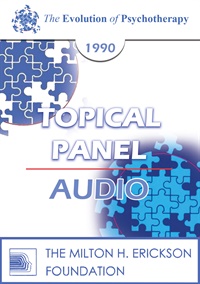
- Average Rating:
- Not yet rated
- Topic Areas:
- Topical Panels | Homework | Psychotherapy | Behavioral Therapy | Strategic Therapy
- Categories:
- Evolution of Psychotherapy | Evolution of Psychotherapy 1990 | Pioneers in Couples and Family Therapy
- Faculty:
- Arnold Lazarus, Ph.D. | Cloe Madanes, HDL, LIC | Mara Selvini Palazzoli, MD | Jeffrey Zeig, PhD
- Duration:
- 59 Minutes
- Format:
- Audio Only
- Original Program Date:
- Dec 12, 1990
- Short Description:
- This panel explores the impact of homework in psychotherapy, highlighting its role in driving behavioral change. Lazarus advocates for action-based, real-world tasks and examines reasons for non-compliance. Madanes shares inventive interventions, such as financial consequences for abuse and symbolic rituals for eating disorders. Palazzoli discusses using invariant prescriptions to expose family dynamics, while Zeig highlights paradoxical tasks and the importance of client follow-through. All panelists stress the value of creative, relevant assignments to enhance therapeutic outcomes. Moderated by Carol Lankton, MA.
- Price:
- $15.00 - Base Price

